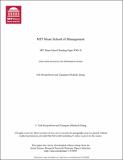Innovation Incentives for Information Goods
Author(s)
Brynjolfsson, Erik; Zhang, Xiaoquan (Michael)
Download0SSRN-id1519899.pdf (603.2Kb)
Metadata
Show full item recordAbstract
Innovations can often be targeted to be more valuable for some consumers than others. This is especially true for digital information goods. We show that the traditional price system not only results in significant deadweight loss, but also provides incorrect incentives to the creators of these innovations. In contrast, we propose and analyze a profit-maximizing mechanism for bundles of digital goods which is more efficient and more accurately provides innovation incentives for information goods. Our “statistical couponing mechanism” does not rely on the universal excludability of information goods, which creates substantial deadweight loss, but instead estimates social value created from new goods and innovations by offering coupons to a relatively small sample of representative consumers. We find that the statistical couponing mechanism can operate with less than 0.1% of the deadweight loss of the traditional price-based system, while more accurately aligning incentives with social value.
Description
This version published in "Innovation Incentives for Information Goods," Innovation Policy
and the Economy eds. Adam B. Jaffe, Josh Lerner and Scott Stern, 2007 vol. 7.
Previous version in published as “Slicing the Gordian Knot: A Novel Mechanism for
Providing Innovation Incentives for Digital Goods” in Proceedings of the International
Conference on Information Systems, December, 2004.
Date issued
2006-06-01Publisher
Cambridge, MA; Alfred P. Sloan School of Management, Massachusetts Institute of Technology
Series/Report no.
MIT Sloan School of Management Working Paper;4780-10
Keywords
Online Content, Information, Mechanism Design, Incentives, Innovation, Bundling, Digital Goods